
Everyone knows Vitamin D and calcium are critical for bone mass, particularly after the age of 40. But there are some lesser-known minerals - and lesser-known facts - crucial for good bone health. According to a report in The Open Orthopedics Journal, these minerals include silicon, magnesium, copper, zinc, manganese and boron. All of these minerals are better for bone health and joint strength. It is important to note that minerals and vitamins are best absorbed by the body in their natural form. This is partly because they are consumed with other dietary elements, which further helps improve overall digestion and absorption. Conversely, synthetic supplements may not be absorbed by the body as they are taken separately. The body may react differently to artificially-created supplements, unlike the food sources of these minerals.
Vegan and vegetarian diets may lack in some vitamins and minerals that essential for bone health. These include calcium, zinc, iron as well as Vitamin B12 and D. In such cases, supplements are indispensable.
Also read: Dairy Plus These 5 Foods Are Your Key To Stronger Bones
Additionally, in the era of fast, processed and packaged foods, selected supplements may still be required, as per the doctor's prescription. Consuming supplements without the doctor's advice can be dangerous and is best avoided.
It is safer to consume foods sources of these minerals. Women will particularly benefit by including these foods in their diet as they typically lose one percent bone mass annually. After menopause, the loss accelerates to four percent per year.
Lesser-known minerals for bone health
1. Magnesium: Deficiency of magnesium can be directly related to osteoporosis. Lack of magnesium in the body leads to formation of crystals and impacts secretion and activity of parathyroid hormone. Magnesium deficiency may also foster low-grade inflammation. In order to increase bone density and increase intake of magnesium, eat more peanuts, cashews, cereals, brown rice, lentils (dal) and kidney beans.
2. Silicon: Silicon is a mineral which improves bone matrix quality. Silicon deficiency means poor skeletal development. Good dietary sources of silicon include whole grain cereals and granola; apricots and prunes; green beans; and brown rice.

Include leafy greens in your diet for stronger bones
Photo Credit: iStock
Also read: Know The Many Health Benefits Of Exercising For Osteoporosis
3. Boron: Deficiency of boron can affect bone development and regeneration. By influencing production and activity of steroid hormones, it helps in preventing loss of calcium and demineralisation of bones. It also minimises urinary excretion of calcium and magnesium while boosting absorption of calcium in peri-and post-menopausal women. Boron also promotes proper utilisation of Vitamin D. Food sources of boron are apricots, raisins, prunes, peanuts and almonds.
4. Vitamin K: Essential for healthy bones, Vitamin K helps lower risk of fractures. It prevents hardening of arteries and build-up of calcium in artery walls. Besides, it also helps in activating osteocalcin protein, which fortifies bone structure and helps bones absorb calcium in a better way. Broccoli, kiwi, kale, spinach, yoghurt and avocado are all rich in Vitamin K.
5. Copper: Inadequate copper levels are linked to osteoporosis. Organ meats such as liver contain high amounts of copper, which is also found in oysters, lobster, Spirulina, almonds, cashews, sesame seeds and dark chocolate.
Also read: This Is What You Should Eat If You Have Weak Bones
6. Manganese: This mineral supports bone development and maintenance. It's especially critical for geriatric people as it boosts bone mineral density in conjunction with zinc, calcium and copper. Almonds, beans, legumes, oatmeal, bran cereals, brown rice, whole-wheat bread, leafy green vegetables, pineapple and dark chocolate are good sources of manganese.
7. Zinc: Deficiency of zinc decreases bone density, leading to osteoporosis. Shellfish, meat, legumes, seeds, nuts, dairy products, eggs and whole grains are good sources.
(Dr Rajeev K Sharma is Chairman, Orthopaedics- Sports Medicine and Arthroplasty, Vimhans Nayati Super Speciality Hospital, New Delhi.)
Disclaimer: The opinions expressed within this article are the personal opinions of the author. NDTV is not responsible for the accuracy, completeness, suitability, or validity of any information on this article. All information is provided on an as-is basis. The information, facts or opinions appearing in the article do not reflect the views of NDTV and NDTV does not assume any responsibility or liability for the same.
Track Latest News Live on NDTV.com and get news updates from India and around the world

